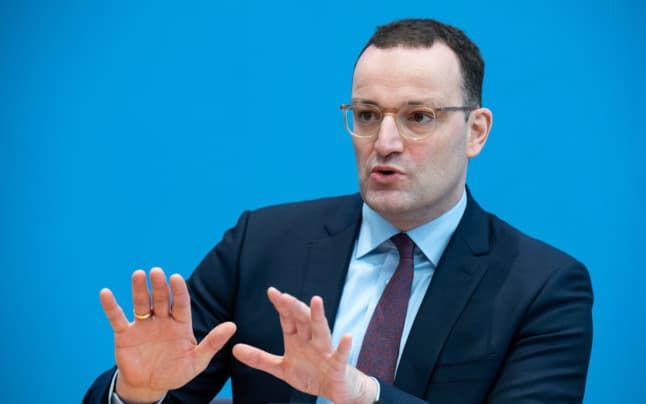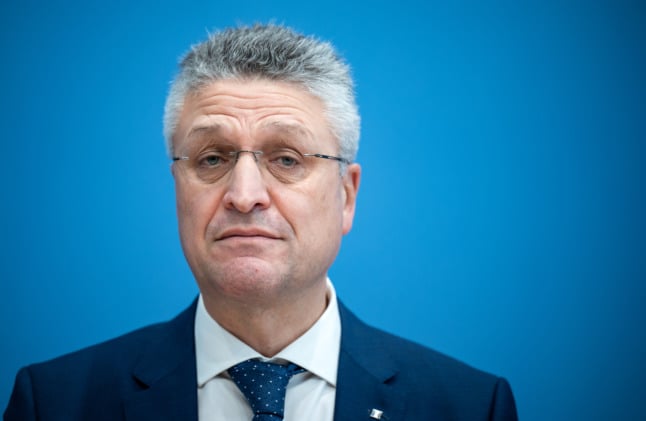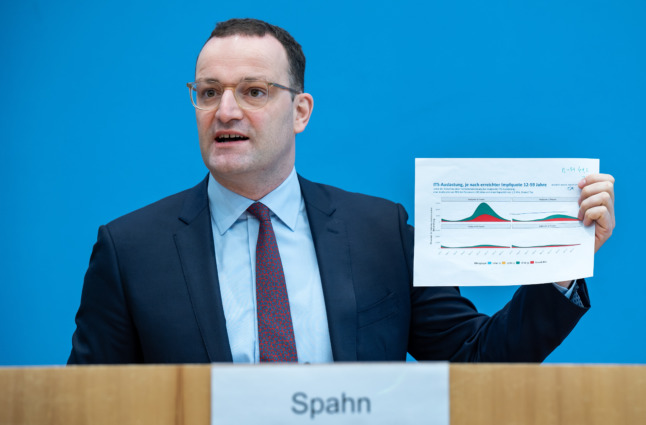German Health Minister calls for 'massive contact restrictions' to fight Covid

German Health Minister Jens Spahn has urged the incoming government to take drastic measures after more than 76,000 new Covid infections were reported within a day, saying the situation was "more serious than any other time in this pandemic."
"The situation is dramatically serious," the CDU politician told reporters gathered in Berlin on Friday. "More serious than at any other time in this pandemic."
Calling the current situation in Germany a 'national emergency', Spahn claimed that the incoming government was doing too little, too late to try and stem the tide. "We must stop this wave now," he warned.
On Friday, the weekly incidence of Covid infections hit yet another new peak of 438 infections per 100,000 people, while the Robert Koch Institute (RKI) reported a record-breaking 76,000 new infections within a day. In the worst-hit region of Saxony, the 7-day incidence recently topped 1,000 per 100,000 people.
In the meantime, weekly hospitalisations have been edging up and now stand at 5.97 per 100,000 people nationally. The daily Covid death toll hit 357 on Friday, bringing the total number of deaths since the start of the pandemic to 100,476.
Criticising politicians who he said had underestimated the scale of the crisis, Spahn warned that the Covid wave would "continue to move west and north" from the regions in the south and east of Germany that have been badly affected so far.
READ ALSO: Merkel gives stark warning as Germany’s Covid death toll tops 100,000
In the short term, he said, there is only one thing that will make a decisive difference: "The number of contacts must be reduced, significantly, otherwise (the measures) are no use at all."
States should introduce consistent access rules that allow entry only to vaccinated and recovered people who have a negative test to hand (a system known as 2G plus) and should consider the cancellation of festive celebrations and large events, he said.
Appearing at the press conference alongside Spahn, RKI president Lothar Wieler also urged lawmakers to take decisive action in order to stem the spread of the virus.

RKI president Lothar Wieler appears at a press conference alongside Jens Spahn on Friday. Photo: picture alliance/dpa | Bernd von Jutrczenka
"I now expect decision-makers to initiate all possible measures to jointly bring the case numbers down," he said, adding that contact restrictions should once again be brought into play.
"With every contact we don't have, with every meeting we forgo, with every crowd we avoid, we help slow the spread of the virus," Wieler said.
He appealed to Germans: "Please get vaccinated or get your booster jabs, and please also comply with all the measures adopted in the federal states."
South African 'supervariant'
At the press conference on Friday morning, Spahn also expressed concern about the new 'supervariant' (B.1.1.529) that has recently appeared in South Africa.
As The Local reported on Friday, the discovery of the new variant has prompted Germany to ban all incoming travel from the country for people who don't live in Germany or hold German citizenship.
The aim must be to avoid the entry of this variant as far as possible, the caretaker health minister said. "The arrival of a new variant is the last thing we need now in our current situation," he added.
Spahn urged all people who have arrived in Germany from South Africa and the surrounding countries in recent days to get tested for the virus with a PCR test to be on the safe side.
RKI chief Wieler said that, as of Friday morning, he was not aware that the virus variant had made it into Europe or Germany.
At the same time, he stressed: "We are very concerned. And I very much hope that stringent work will be done to at least limit the spread of this variant as much as possible through travel restrictions."
In some provinces of South Africa, there's been a stark upswing in the number of infections over the past few days, which experts believe could be due to the new variant.
Compared to Delta, which has two mutations, and Beta, which has three, the as-yet unnamed South African variant has ten mutations, meaning it could be more resistant to vaccines, spread faster and place more strain on the human immune system.
The World Health Organisation (WHO) is said to be studying the newly emerged variant to see if it should be classed as variant of 'interest' or 'concern'.
READ ALSO: German to ban travel from South Africa over new Covid variant
Meeting of state leaders
On Thursday, November 25th, Germany's 'epidemic situation of national importance' was allowed to expire after almost a year and a half. The epidemic situation clause had granted sweeping powers to the federal government and states to impose Covid restrictions such as lockdowns and mandatory masks without consulting parliament.
The incoming government has opted to replace the clause with amendments to the Infection Protection Act, but critics from the opposition CDU/CSU parties say the new regulation does not go far enough.
In order to get their amended Act through the upper house of parliament, the three 'traffic light' parties were forced to strike a deal with Merkel's conservatives. The deal ensured that the bill would be allowed to pass in the Bundesrat - but only if it was subject to review at the next meeting of state leaders on December 9th.

Health Minister Jens Spahn (CDU) holds up a graph to reporters at Friday's press conference. Photo: picture alliance/dpa | Bernd von Jutrczenka
With the Covid situation worsening daily, however, outgoing Health Minister Spahn has been calling on state leaders to bring the meeting forward. The meeting should ideally be held over the next few days, he said.
In light of the rising number of Covid patients on intensive care wards, urgent operations are currently having to be cancelled and postponed, while up to 100 intensive care patients have had to be moved to other hospitals in Germany where medical staff are less overburdened, Spahn revealed.
But these are only temporary solutions and cannot continue indefinitely, he said.
According to Spahn, however, there is one piece of good news: "The vaccination campaign is picking up again."
In the past three days, there have been more than 300,000 new vaccinations against Covid, while this week, more than two million booster vaccinations have been administered.
"Every vaccination gives hope that this winter will not be as dark as it currently looks," the Health Minister said.
READ ALSO:
Comments (1)
See Also
"The situation is dramatically serious," the CDU politician told reporters gathered in Berlin on Friday. "More serious than at any other time in this pandemic."
Calling the current situation in Germany a 'national emergency', Spahn claimed that the incoming government was doing too little, too late to try and stem the tide. "We must stop this wave now," he warned.
On Friday, the weekly incidence of Covid infections hit yet another new peak of 438 infections per 100,000 people, while the Robert Koch Institute (RKI) reported a record-breaking 76,000 new infections within a day. In the worst-hit region of Saxony, the 7-day incidence recently topped 1,000 per 100,000 people.
In the meantime, weekly hospitalisations have been edging up and now stand at 5.97 per 100,000 people nationally. The daily Covid death toll hit 357 on Friday, bringing the total number of deaths since the start of the pandemic to 100,476.
Criticising politicians who he said had underestimated the scale of the crisis, Spahn warned that the Covid wave would "continue to move west and north" from the regions in the south and east of Germany that have been badly affected so far.
READ ALSO: Merkel gives stark warning as Germany’s Covid death toll tops 100,000
In the short term, he said, there is only one thing that will make a decisive difference: "The number of contacts must be reduced, significantly, otherwise (the measures) are no use at all."
States should introduce consistent access rules that allow entry only to vaccinated and recovered people who have a negative test to hand (a system known as 2G plus) and should consider the cancellation of festive celebrations and large events, he said.
Appearing at the press conference alongside Spahn, RKI president Lothar Wieler also urged lawmakers to take decisive action in order to stem the spread of the virus.

RKI president Lothar Wieler appears at a press conference alongside Jens Spahn on Friday. Photo: picture alliance/dpa | Bernd von Jutrczenka
"I now expect decision-makers to initiate all possible measures to jointly bring the case numbers down," he said, adding that contact restrictions should once again be brought into play.
"With every contact we don't have, with every meeting we forgo, with every crowd we avoid, we help slow the spread of the virus," Wieler said.
He appealed to Germans: "Please get vaccinated or get your booster jabs, and please also comply with all the measures adopted in the federal states."
South African 'supervariant'
At the press conference on Friday morning, Spahn also expressed concern about the new 'supervariant' (B.1.1.529) that has recently appeared in South Africa.
As The Local reported on Friday, the discovery of the new variant has prompted Germany to ban all incoming travel from the country for people who don't live in Germany or hold German citizenship.
The aim must be to avoid the entry of this variant as far as possible, the caretaker health minister said. "The arrival of a new variant is the last thing we need now in our current situation," he added.
Spahn urged all people who have arrived in Germany from South Africa and the surrounding countries in recent days to get tested for the virus with a PCR test to be on the safe side.
RKI chief Wieler said that, as of Friday morning, he was not aware that the virus variant had made it into Europe or Germany.
At the same time, he stressed: "We are very concerned. And I very much hope that stringent work will be done to at least limit the spread of this variant as much as possible through travel restrictions."
In some provinces of South Africa, there's been a stark upswing in the number of infections over the past few days, which experts believe could be due to the new variant.
Compared to Delta, which has two mutations, and Beta, which has three, the as-yet unnamed South African variant has ten mutations, meaning it could be more resistant to vaccines, spread faster and place more strain on the human immune system.
The World Health Organisation (WHO) is said to be studying the newly emerged variant to see if it should be classed as variant of 'interest' or 'concern'.
READ ALSO: German to ban travel from South Africa over new Covid variant
Meeting of state leaders
On Thursday, November 25th, Germany's 'epidemic situation of national importance' was allowed to expire after almost a year and a half. The epidemic situation clause had granted sweeping powers to the federal government and states to impose Covid restrictions such as lockdowns and mandatory masks without consulting parliament.
The incoming government has opted to replace the clause with amendments to the Infection Protection Act, but critics from the opposition CDU/CSU parties say the new regulation does not go far enough.
In order to get their amended Act through the upper house of parliament, the three 'traffic light' parties were forced to strike a deal with Merkel's conservatives. The deal ensured that the bill would be allowed to pass in the Bundesrat - but only if it was subject to review at the next meeting of state leaders on December 9th.

Health Minister Jens Spahn (CDU) holds up a graph to reporters at Friday's press conference. Photo: picture alliance/dpa | Bernd von Jutrczenka
With the Covid situation worsening daily, however, outgoing Health Minister Spahn has been calling on state leaders to bring the meeting forward. The meeting should ideally be held over the next few days, he said.
In light of the rising number of Covid patients on intensive care wards, urgent operations are currently having to be cancelled and postponed, while up to 100 intensive care patients have had to be moved to other hospitals in Germany where medical staff are less overburdened, Spahn revealed.
But these are only temporary solutions and cannot continue indefinitely, he said.
According to Spahn, however, there is one piece of good news: "The vaccination campaign is picking up again."
In the past three days, there have been more than 300,000 new vaccinations against Covid, while this week, more than two million booster vaccinations have been administered.
"Every vaccination gives hope that this winter will not be as dark as it currently looks," the Health Minister said.
READ ALSO:
Join the conversation in our comments section below. Share your own views and experience and if you have a question or suggestion for our journalists then email us at [email protected].
Please keep comments civil, constructive and on topic – and make sure to read our terms of use before getting involved.
Please log in here to leave a comment.